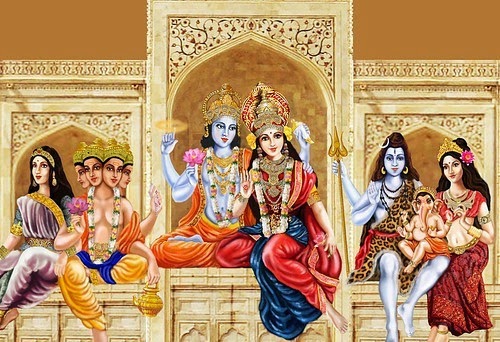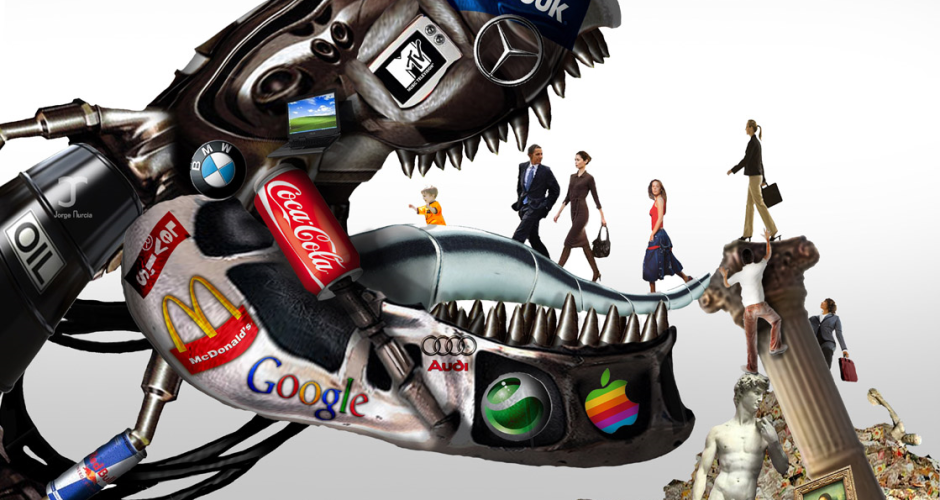The Spread of the Monoculture
 Western civilization, in spite of claims to support diversity, is promoting a worldwide monoculture—the same basic values, institutions and points of view for everyone—which it calls ‘globalization’. Western commercial culture with its pursuit of markets and commodities eliminates all true culture, which is based on quality, not quantity. It creates a culture of money that submerges any true culture of refinement or spirituality, in which everything can be bought and sold, possessed or capitalized on.
Western civilization, in spite of claims to support diversity, is promoting a worldwide monoculture—the same basic values, institutions and points of view for everyone—which it calls ‘globalization’. Western commercial culture with its pursuit of markets and commodities eliminates all true culture, which is based on quality, not quantity. It creates a culture of money that submerges any true culture of refinement or spirituality, in which everything can be bought and sold, possessed or capitalized on.
If we visit shopping malls in America today, for example, it is hard to tell what state in the country we are located in. The shopping malls in Florida, California, New York or the Midwest have the same basic stores and sell the same basic products. The streets look the same, as do the houses, apartment buildings and office buildings. People eat the same basic types of food and have the same habits of work, sleep and relaxation. Almost everything is mass-produced and follows the same economy driven forces.
 These same types of businesses pioneered in America are spreading worldwide, whether it is Coca Cola, McDonalds, blue jeans or Barbie dolls. One finds the same multinational corporations operating in nearly every major city of the world, whether Tokyo, Shanghai, Mumbai or London. While one finds foreign stores like Chinese restaurants in shopping malls even in America, which have their niche in the global scene, these operate according to the same commercial approach as standard western businesses. They do not represent real globalization but a co-opting of foreign businesses by the western commercial culture.
These same types of businesses pioneered in America are spreading worldwide, whether it is Coca Cola, McDonalds, blue jeans or Barbie dolls. One finds the same multinational corporations operating in nearly every major city of the world, whether Tokyo, Shanghai, Mumbai or London. While one finds foreign stores like Chinese restaurants in shopping malls even in America, which have their niche in the global scene, these operate according to the same commercial approach as standard western businesses. They do not represent real globalization but a co-opting of foreign businesses by the western commercial culture.
The world media is yet more of a monoculture. News services worldwide provide what are essentially the same stories from the same cultural slant. They are standardized in a western model and promote a western point of view with western ideals of free trade, social equality, democracy and affluence. People all over the world watch Hollywood movies, listen to the pop music of the US and Europe, and adulate American athletes.
Similarly, in the universities of the world, it is mainly western civilization that is taught, even if there is an old and profound civilization. In a country like India, Shakespeare is a much better known and quoted poet than Kalidas, the equivalent great Sanskrit poet. The West honors the Japanese for enthusiastically taking up western culture, music and entertainment. But it regards as close-minded or communal, cultures that try to hold their own ground and avoid the consumerist assimilation.
The Danger of Monoculture
 This consumerist monoculture is a great leveler of culture. Wherever it goes it either destroys or co-opts the local culture. It destroys local culture by ending native traditions and replacing them with western business, political, religious or intellectual models. It co-opts them by turning local arts and crafts into exotic ware for mass marketing, for example, how Native American culture has been turned into a big business in the US, though the money seldom goes to the natives! Monoculture results in ‘deculturalization’ in which entire cultures and civilizations are subverted or eliminated. Modern commercial culture is monopolistic and seeks hegemony, though it allows a diversity within its ranks so long as it doesn’t interfere with its expansionist aims.
This consumerist monoculture is a great leveler of culture. Wherever it goes it either destroys or co-opts the local culture. It destroys local culture by ending native traditions and replacing them with western business, political, religious or intellectual models. It co-opts them by turning local arts and crafts into exotic ware for mass marketing, for example, how Native American culture has been turned into a big business in the US, though the money seldom goes to the natives! Monoculture results in ‘deculturalization’ in which entire cultures and civilizations are subverted or eliminated. Modern commercial culture is monopolistic and seeks hegemony, though it allows a diversity within its ranks so long as it doesn’t interfere with its expansionist aims.
We can compare this social monoculture with plant monoculture. Monoculture in farming occurs when the same crops are planted over and again in the same soil. The result is that the soil gets exhausted. Monoculture in nature occurs when the diversity of plant species is destroyed by deforestation and a few species, often of foreign origin, are planted instead or simply flourish as weeds. Monoculture in agriculture and forestry result in the loss of both plant and animal species.
 Similarly, monoculture in human culture brings about the loss of cultural and individual diversity. Today we are witnessing, generally silently, an appalling and rapid disappearance of traditional cultures. Languages, the hallmark of culture, are passing away in the world at a rapid rate. Monoculture with its standardization and uniformity is the rule. Franchise is the game in businesses of all types. Local and home owned stores are disappearing, just as the family farm has given way to global agribusiness run by large oil companies (like Exxon owning vast tracts of farmland in California)!
Similarly, monoculture in human culture brings about the loss of cultural and individual diversity. Today we are witnessing, generally silently, an appalling and rapid disappearance of traditional cultures. Languages, the hallmark of culture, are passing away in the world at a rapid rate. Monoculture with its standardization and uniformity is the rule. Franchise is the game in businesses of all types. Local and home owned stores are disappearing, just as the family farm has given way to global agribusiness run by large oil companies (like Exxon owning vast tracts of farmland in California)!
We can draw a further analogy between the monoculture and the use of terminator seeds, which when planted render native seeds sterile. The real purpose of such seeds is not to increase food production but to make farmers worldwide dependent on seed banks for further crops that puts them under control of the global agribusiness. The monoculture tries to control the rules of debate and the presentation of ideas worldwide, which all goes back to it for validation. People only gain validity in their field when famous or recognized by the monoculture and its media.
 Representatives of other cultural traditions don’t count for anything. The result is that people go to monoculture institutions to gain credibility even in their local cultural disciplines. In the Indian context, Indian scholars seek their credentials not in their own temples and ashrams of their own country but in western institutions like Heidelberg, Oxford or Harvard, or in westernized departments of their own countries like at JNU (Jawaharlal Nehru University), the center of leftist thought in India. Such scholars become opponents of their own cultural traditions, supplanting native schools of thought with the cultural seeds of the West, putting an end to their own independent traditions of thought which they are supposed to represent!
Representatives of other cultural traditions don’t count for anything. The result is that people go to monoculture institutions to gain credibility even in their local cultural disciplines. In the Indian context, Indian scholars seek their credentials not in their own temples and ashrams of their own country but in western institutions like Heidelberg, Oxford or Harvard, or in westernized departments of their own countries like at JNU (Jawaharlal Nehru University), the center of leftist thought in India. Such scholars become opponents of their own cultural traditions, supplanting native schools of thought with the cultural seeds of the West, putting an end to their own independent traditions of thought which they are supposed to represent!
The destruction of cultural diversity, like that of biodiversity, is devastating to living systems. The loss of cultural diversity does to human beings what the destruction of biodiversity does to the world of nature. Just as we are destroying our outer landscape of forests and wilderness, so we are destroying our inner landscape of art and spirituality. Our minds are as polluted as our rivers.
Monoculture and the Quality of Life
 Monoculture claims to improve life by raising ‘living standards’. People all over the world make what is on paper a much higher income than that of their parents. With this income they can buy computers, televisions, stereos, or whatever the latest technological equipment happens to be. They can afford to go to restaurants, watch movies or travel and stay in expensive hotels.
Monoculture claims to improve life by raising ‘living standards’. People all over the world make what is on paper a much higher income than that of their parents. With this income they can buy computers, televisions, stereos, or whatever the latest technological equipment happens to be. They can afford to go to restaurants, watch movies or travel and stay in expensive hotels.
However, this increased ‘paper wealth’ is deceptive. Their houses, which on paper are worth phenomenally more than those of their parents, are usually smaller and much more expensive to maintain. In fact, housing shortages are everywhere. The beautiful scenery of nature that used to surround human habitats is replaced by a bleak urban environment of cement, glass and steel, in which the garden is but a few potted plants on a terrace overlooking the street!
 The quality of air and water has been greatly reduced all over the world. Our cities have air that is unhealthy to breathe. Most of our water is unfit to drink. Even fish cannot live in most of our streams. The quality of food is significantly less in spite of advances in corporate farming. Fast food and over-spiced restaurant food replace the home grown or freshly cooked food of previous generations. Good quality fresh fruit and vegetables, which used to be commonly available, are now only rarely found in special natural food stores in the West at a special price.
The quality of air and water has been greatly reduced all over the world. Our cities have air that is unhealthy to breathe. Most of our water is unfit to drink. Even fish cannot live in most of our streams. The quality of food is significantly less in spite of advances in corporate farming. Fast food and over-spiced restaurant food replace the home grown or freshly cooked food of previous generations. Good quality fresh fruit and vegetables, which used to be commonly available, are now only rarely found in special natural food stores in the West at a special price.
The monoculture person has less real leisure time than previous generations. We are busy all week long working, using our spare time for shopping or other chores. There are few local cultural events of music, plays, festivals and dance and even these have been commercialized and are spectator events, not the participatory events of earlier times. They have no aura of the sacred that the rituals of previous generations often had. The real victim of monoculture, therefore, is the individual who is deprived of any direct contact with nature, the universe, a community, himself or herself.
The movement toward monoculture arose through the industrial revolution and the printing press that could standardize information. It mushroomed in the twentieth century with global industrialization. Now with the computer and media age it is far advanced, moving forward at times almost like a blind steamroller crushing everything in its path.
Monoculture and Monotheism
 The roots of monoculture in western civilization can be traced to monotheism, particularly of a missionary type—the effort to impose a belief in only One God of a certain type on all people, ignoring all other spiritual paths, however old or rich in ideas and experiences. This One God appears as a tyrannical, if not militant being who has a severe set of rewards and punishments—which necessitates a single savior, bible and church for the entire world. Whether this was the original intent of the prophets or a deviation, it has come to represent the dominant trend in western religious thinking and the orientation of western culture both religious and secular.
The roots of monoculture in western civilization can be traced to monotheism, particularly of a missionary type—the effort to impose a belief in only One God of a certain type on all people, ignoring all other spiritual paths, however old or rich in ideas and experiences. This One God appears as a tyrannical, if not militant being who has a severe set of rewards and punishments—which necessitates a single savior, bible and church for the entire world. Whether this was the original intent of the prophets or a deviation, it has come to represent the dominant trend in western religious thinking and the orientation of western culture both religious and secular.
Under early Christianity, monotheism allied itself with Roman imperialism and an allegiance to the state—which was a political monoculture—turning a religious rigidity into a military weapon. In the colonial era, western monoculture became a cult of church and empire as a means of conquering the world, to make everyone western and Christian in civilization. Monoculture extends from an expansionist monotheism, which is monoculture in religion and destroys religious diversity and individual spiritual experience that is only possible apart from any church and its dogma. It leads to other forms of monoculture politically, economically, socially and intellectually.
 Western monotheism is essentially an authoritarian tradition and monotheistic institutions like the Vatican are authoritarian hierarchies to the present day, with orders being imposed upon the masses from on above. The dogma of the book, prophet or savior and One God cannot be questioned. Anti-blasphemy laws remain in effect in so-called Islamic ‘republics’, making it a crime, if not a capital offense, to even question the book or the prophet. Anti-apostasy laws are also there, making it a crime for a Muslim to convert to another religion (but allowing members of other religions to convert to Islam). Such laws were present in medieval Christianity where they were used to oppress science and stop any freethinking.
Western monotheism is essentially an authoritarian tradition and monotheistic institutions like the Vatican are authoritarian hierarchies to the present day, with orders being imposed upon the masses from on above. The dogma of the book, prophet or savior and One God cannot be questioned. Anti-blasphemy laws remain in effect in so-called Islamic ‘republics’, making it a crime, if not a capital offense, to even question the book or the prophet. Anti-apostasy laws are also there, making it a crime for a Muslim to convert to another religion (but allowing members of other religions to convert to Islam). Such laws were present in medieval Christianity where they were used to oppress science and stop any freethinking.
Today, however, Christians have put a new spin on their monotheism. They would equate monotheism, if not Christianity itself, with unity, equality and democracy—One God and one humanity. However, this is done without changing the exclusive and monopolistic nature of Christian beliefs or institutions, making one doubt its sincerity. The current pope, for example, though really a conservative figure, has used this form of propaganda to justify Catholic conversion efforts in the world.
 He would have us believe that promoting an authoritarian church and its antiquated dogma was somehow liberal and would advance political freedom, particularly in non-Christian countries, where the church would come in to save people from anti-democratic governments and social inequalities! He speaks out against the lack of freedom and democracy in various countries without introducing these into his own church first!
He would have us believe that promoting an authoritarian church and its antiquated dogma was somehow liberal and would advance political freedom, particularly in non-Christian countries, where the church would come in to save people from anti-democratic governments and social inequalities! He speaks out against the lack of freedom and democracy in various countries without introducing these into his own church first!
Monotheism and Christianity are being equated in the West with democracy and human rights, though this was certainly no part of their colonial rule. We should look at Central and South America, where an alliance of the church with dictators and military rulers has been long standing, and which continue to have a great inequality between the rich and the poor, those of European blood and the native Indians. We must remember that the fascist dictators of Europe and America, including Mussolini, were good Catholics that the church did not seriously oppose. Yet those who oppose the missionaries today in the third world are called fascists or communalists, not the missionaries, completely ignoring the facts of history!
Monoculture, in turn, has no real problem with monotheism, though western monotheism is largely authoritarian and anti-democratic. There is no one person, one vote idea in these religions but only fiats and fatwas from on high. Monoculture treats the monotheistic church with the same dignity of any country or corporation that has economic or political clout. This is because western monotheism has adopted the corporate model and used its numbers and resources to gain political influence and favors. It has created a global multinational religious business using the media and the Internet for proselytizing, spreading a religious message like an advertising campaign. The world media does not challenge such religious aggression, any more than it does the aggression of the fast food industry.
Nineteenth century colonial rulers, like the British in India, found missionaries to be useful, even though Europe at the time had many free thinkers questioning the church and the Bible. So too, the modern monoculture finds missionaries to be a helpful tool—even though they represent a more conservative form of Christianity than practiced by most people in the West. Such backward religious beliefs appeal to the poor and uneducated, which is why the most devout Christian countries like those in South America are among the most backward in the world. This means that Christianity can be provide a first stage in the westernization of poorer cultures, particularly those like India that have deep religious roots.
Monoculture and Democracy
 Monoculture has made a home with democracy. This may be surprising at first because democracy appears as the ultimate form of pluralism, with each individual a free and equal member of society. After all, democracy allows each person, even the poor, weak or elderly, the same one vote. However, current democracies only have the appearance of pluralism. If we look deeper, only an educated democracy can be truly pluralistic. An uneducated democracy can create its own form of totalitarianism or mob rule. The masses are easy to manipulate by money, the media or an appeal to prejudices and vote banks. Getting elected for a politician in a modern democracy is not a matter of encouraging pluralism but of manipulating public opinion with slogans and promises that are seldom kept. Charismatic movie stars can easily defeat seasoned diplomats. The modern politician resembles more a Roman emperor controlling the masses through bread and circuses than any true representative of the people or of an enlightened culture.
Monoculture has made a home with democracy. This may be surprising at first because democracy appears as the ultimate form of pluralism, with each individual a free and equal member of society. After all, democracy allows each person, even the poor, weak or elderly, the same one vote. However, current democracies only have the appearance of pluralism. If we look deeper, only an educated democracy can be truly pluralistic. An uneducated democracy can create its own form of totalitarianism or mob rule. The masses are easy to manipulate by money, the media or an appeal to prejudices and vote banks. Getting elected for a politician in a modern democracy is not a matter of encouraging pluralism but of manipulating public opinion with slogans and promises that are seldom kept. Charismatic movie stars can easily defeat seasoned diplomats. The modern politician resembles more a Roman emperor controlling the masses through bread and circuses than any true representative of the people or of an enlightened culture.
 In addition, promoting democracy worldwide is a good tool to destroy political diversity. No other political systems are allowed today in the world but democracy of a western-style nature—which means the rule of business, the media and the monoculture, along with the promotion of western civilization.
In addition, promoting democracy worldwide is a good tool to destroy political diversity. No other political systems are allowed today in the world but democracy of a western-style nature—which means the rule of business, the media and the monoculture, along with the promotion of western civilization.
Groups agitating for a western style democracy systematically undermine other governments as if anything else were immoral, just as monotheistic religions cannot tolerate other religious views. Modern democracy does not allow for pluralism in governmental systems but requires that it is the only acceptable form, just as monotheism claims all morality for itself and equates other forms of spirituality with the devil. Modern democracies give the vote to the isolated individual, who is easy to manipulate. Other power centers of a local kind get marginalized, just as multinational corporations and their franchises put an end to local businesses and native crafts under the guise of free trade. Modern democracies are largely state run governments and have little place for the local rule found in traditional societies, where the village, tribe or community had the rights of self-determination over the most important issues of life, health and work. The state, like the churches previously, doles out its favors and makes the individuals dependent upon it for their livelihood. Leaders pretend to be doing the will of the people when they are only making the people subservient and keeping them ignorant.
Modern democracies give the vote to the isolated individual, who is easy to manipulate. Other power centers of a local kind get marginalized, just as multinational corporations and their franchises put an end to local businesses and native crafts under the guise of free trade. Modern democracies are largely state run governments and have little place for the local rule found in traditional societies, where the village, tribe or community had the rights of self-determination over the most important issues of life, health and work. The state, like the churches previously, doles out its favors and makes the individuals dependent upon it for their livelihood. Leaders pretend to be doing the will of the people when they are only making the people subservient and keeping them ignorant.
Democracy has created an atomization of society, the reduction of all social groups to the isolated individual, who removed from more intimate social support becomes exposed and easy to influence. Without the social support of family and community, for example, the elderly end up as wards of the state, on Medicare. Such state care, though deemed compassionate, is impersonal, often cruel and masks a fundamental destruction of natural social orders. The social isolation created by modern democracy is resulting in an epidemic of depression in the West that is striking all age groups but particularly those in middle age. The prescription drug industry has become the compassionate savior of modern society, but is really getting an entire culture addicted to drugs as the solution to their mounting physical and psychological problems! Governments debate on how much money to spend on prescription drugs for the elderly, but they never ask why an entire generation is dependent upon drugs for its well-being.
Monoculture and Free Trade
 Monoculture does quite well with free trade and the spread of global consumerism, which is monoculture economics. Other economic systems are not allowed and are systematically undermined. The economic might of the monoculture levels any economic diversity, moving towards a single financial standard or currency worldwide. A uniform world economy destroys local economies and their rich diversity of expression and interactions based on an organic dependency. The rule of multinational businesses takes the place of local economies. Global corporate solutions are applied to local management issues, often with disastrous results.
Monoculture does quite well with free trade and the spread of global consumerism, which is monoculture economics. Other economic systems are not allowed and are systematically undermined. The economic might of the monoculture levels any economic diversity, moving towards a single financial standard or currency worldwide. A uniform world economy destroys local economies and their rich diversity of expression and interactions based on an organic dependency. The rule of multinational businesses takes the place of local economies. Global corporate solutions are applied to local management issues, often with disastrous results.
Corporate agriculture, the new agricultural monoculture, for example, is advertising its ability to feed the world and end world hunger, portraying itself in the benefic aspect of the church or a socialist government selflessly aiding the poor. What it is really doing is undermining the most basic of human rights, the right to feed oneself and to control one’s food sources. What the global agribusiness envisions is control of the world food market, so that it can force entire countries to bow down before it, who cannot even eat without its favor. Among its tools are genetically engineered crops, including terminator seeds that destroy local plant varieties, fertilizers that weaken the soils and breed dependency, and patents on plants that afford corporate ownership to nature’s bounty. Meanwhile, those who oppose the global food business are deemed backwards, causing hunger and starvation in the world, as if apart from the agribusiness no one could feed themselves!
Should any group oppose the monoculture, the religious, political, intellectual and economic forces of monoculture will attack it, often mercilessly. Monoculture ideas of monotheism, democracy, social equality and free trade are used as the moral torch to consume all other cultural views. They are deemed ‘universal’, meaning that no one can question them or look to what is really working behind them. Such ‘universalism’ is simply a new mask of intolerance. The very forces that try to resist monoculture are denigrated as communal, undemocratic and unprogressive, even if they are pluralistic in their approach or reflect a deep spiritual wisdom or love of nature.
For example, the Hindu effort to resist missionaries in India is portrayed in the media as a form of religious fundamentalism, while the Christian missionary aggression and intolerance of Hindu pluralism is deemed progressive. Similarly, when Hindu economic activists used the slogan of ‘computer chips yes, potato chips no’, resisting the American fast food industry, the western media deems the response to be backward and confused.
The Hindu Model of Pluralism
 The Hindu model of culture is not one of monoculture but of cultural diversity, like India’s landscape of many wide rivers and towering mountains. Hindu civilization is based upon a pluralistic model and a synthetic approach to life’s problems. It acknowledges that different points of view may be valid for different individuals and communities and encourages these to develop unhindered by any overriding church, state or business concerns. Its sense of unity arises through interdependence. We see this in Hindu religions that offer many sages, yogis, teachings, a diversity of Gods and Goddesses, and a recognition of both the One and the many.
The Hindu model of culture is not one of monoculture but of cultural diversity, like India’s landscape of many wide rivers and towering mountains. Hindu civilization is based upon a pluralistic model and a synthetic approach to life’s problems. It acknowledges that different points of view may be valid for different individuals and communities and encourages these to develop unhindered by any overriding church, state or business concerns. Its sense of unity arises through interdependence. We see this in Hindu religions that offer many sages, yogis, teachings, a diversity of Gods and Goddesses, and a recognition of both the One and the many.
Western civilization as it has developed over the past centuries, on the other hand, is monolithic and singularistic. It imposes a single point of view on everyone. Its sense of unity arises from uniformity. We see this in western religions that require a single God, book, savior, prophet or church for everyone. The one God of western monotheism reflects this need for control, uniformity, power, retribution and revenge.
 In the colonial era, western powers sought to impose their religion on Asia using force, intimidation and incentives and denigrating Indic religions as primitive, promoting conversion as a necessity for civilized growth. In the post-colonial era, western religions use the guise of democracy and human rights to continue the same proselytizing efforts. When Indic religions oppose them, they are labeled communal, intolerant or anti-democratic.
In the colonial era, western powers sought to impose their religion on Asia using force, intimidation and incentives and denigrating Indic religions as primitive, promoting conversion as a necessity for civilized growth. In the post-colonial era, western religions use the guise of democracy and human rights to continue the same proselytizing efforts. When Indic religions oppose them, they are labeled communal, intolerant or anti-democratic.
Democracy itself has become the instrument of a consumerist totalitarianism. The masses are easily manipulated by the ability to promote and fulfill their material desires, their needs for greater entertainment or new conveniences. The Asian view is not one of democratic uniformity but of an organic order that recognizes different individual, class and cultural needs. We must look at society like the human body in which there is a unity of being but a diversity of functions. For true freedom in the world, there must be both material and spiritual freedom, which requires freedom from any cultural domination whether economically, politically or religiously.
However, certain aspects of Hindu thought and culture can become popular, trendy or commercially viable in the monoculture today. This is most obvious in the Yoga movement that is already being mass marketed and turned into franchises. Yet whether this serves to spiritualize western culture to corrupt the spiritual traditions of the East remains to be seen.
This rising interest in spirituality has occurred because the materialist monoculture leaves people inwardly empty. Material affluence has resulted in spiritual poverty and psychological malaise. It is also because western religions are rather bland affairs compared to exotic Hinduism and all of its gurus, deities and Yoga practices. Those who have gone through the monoculture and seen its limitations are more likely to be attracted to the dharmic traditions of the East.
 The question then arises whether Hindu culture is rich and diverse enough overcome the monoculture or assimilate it over time. No doubt it can do so eventually. The issue is how much time and effort and obstructions along the way will be required to change the monoculture. But for this to occur, Hindu thought and its pluralistic sense of the Divine must become part of the new paradigm. Over time, the natural human urge for diversity will also arise to counter monoculture that must lead to sterility, like monoculture in agriculture.
The question then arises whether Hindu culture is rich and diverse enough overcome the monoculture or assimilate it over time. No doubt it can do so eventually. The issue is how much time and effort and obstructions along the way will be required to change the monoculture. But for this to occur, Hindu thought and its pluralistic sense of the Divine must become part of the new paradigm. Over time, the natural human urge for diversity will also arise to counter monoculture that must lead to sterility, like monoculture in agriculture.
The movement toward global uniformity must be abandoned, not only materially but also spiritually. True globalism is not that of monoculture consumerism but based on a respect for local environments, which also means honoring local cultures.
True culture is not a commercial commodity but is priceless. It is rooted in a consciousness, a state of mind, and harmony with the natural world. Keeping up with the latest trends in the market place will never take us there. To discover it we must turn our machines off and look within.






























